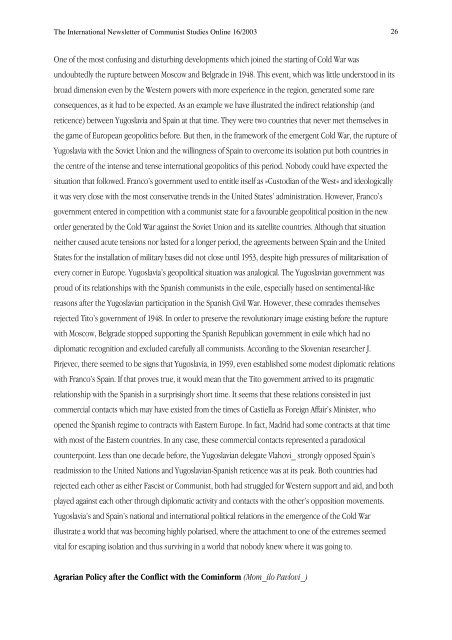The International Newsletter of Communist Studies Online IX
The International Newsletter of Communist Studies Online IX
The International Newsletter of Communist Studies Online IX
You also want an ePaper? Increase the reach of your titles
YUMPU automatically turns print PDFs into web optimized ePapers that Google loves.
<strong>The</strong> <strong>International</strong> <strong>Newsletter</strong> <strong>of</strong> <strong>Communist</strong> <strong>Studies</strong> <strong>Online</strong> 16/2003 26<br />
One <strong>of</strong> the most confusing and disturbing developments which joined the starting <strong>of</strong> Cold War was<br />
undoubtedly the rupture between Moscow and Belgrade in 1948. This event, which was little understood in its<br />
broad dimension even by the Western powers with more experience in the region, generated some rare<br />
consequences, as it had to be expected. As an example we have illustrated the indirect relationship (and<br />
reticence) between Yugoslavia and Spain at that time. <strong>The</strong>y were two countries that never met themselves in<br />
the game <strong>of</strong> European geopolitics before. But then, in the framework <strong>of</strong> the emergent Cold War, the rupture <strong>of</strong><br />
Yugoslavia with the Soviet Union and the willingness <strong>of</strong> Spain to overcome its isolation put both countries in<br />
the centre <strong>of</strong> the intense and tense international geopolitics <strong>of</strong> this period. Nobody could have expected the<br />
situation that followed. Franco’s government used to entitle itself as »Custodian <strong>of</strong> the West« and ideologically<br />
it was very close with the most conservative trends in the United States’ administration. However, Franco’s<br />
government entered in competition with a communist state for a favourable geopolitical position in the new<br />
order generated by the Cold War against the Soviet Union and its satellite countries. Although that situation<br />
neither caused acute tensions nor lasted for a longer period, the agreements between Spain and the United<br />
States for the installation <strong>of</strong> military bases did not close until 1953, despite high pressures <strong>of</strong> militarisation <strong>of</strong><br />
every corner in Europe. Yugoslavia’s geopolitical situation was analogical. <strong>The</strong> Yugoslavian government was<br />
proud <strong>of</strong> its relationships with the Spanish communists in the exile, especially based on sentimental-like<br />
reasons after the Yugoslavian participation in the Spanish Civil War. However, these comrades themselves<br />
rejected Tito’s government <strong>of</strong> 1948. In order to preserve the revolutionary image existing before the rupture<br />
with Moscow, Belgrade stopped supporting the Spanish Republican government in exile which had no<br />
diplomatic recognition and excluded carefully all communists. According to the Slovenian researcher J.<br />
Pirjevec, there seemed to be signs that Yugoslavia, in 1959, even established some modest diplomatic relations<br />
with Franco’s Spain. If that proves true, it would mean that the Tito government arrived to its pragmatic<br />
relationship with the Spanish in a surprisingly short time. It seems that these relations consisted in just<br />
commercial contacts which may have existed from the times <strong>of</strong> Castiella as Foreign Affair’s Minister, who<br />
opened the Spanish regime to contracts with Eastern Europe. In fact, Madrid had some contracts at that time<br />
with most <strong>of</strong> the Eastern countries. In any case, these commercial contacts represented a paradoxical<br />
counterpoint. Less than one decade before, the Yugoslavian delegate Vlahovi_ strongly opposed Spain’s<br />
readmission to the United Nations and Yugoslavian-Spanish reticence was at its peak. Both countries had<br />
rejected each other as either Fascist or <strong>Communist</strong>, both had struggled for Western support and aid, and both<br />
played against each other through diplomatic activity and contacts with the other’s opposition movements.<br />
Yugoslavia’s and Spain’s national and international political relations in the emergence <strong>of</strong> the Cold War<br />
illustrate a world that was becoming highly polarised, where the attachment to one <strong>of</strong> the extremes seemed<br />
vital for escaping isolation and thus surviving in a world that nobody knew where it was going to.<br />
Agrarian Policy after the Conflict with the Cominform (Mom_ilo Pavlovi_)














